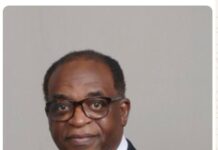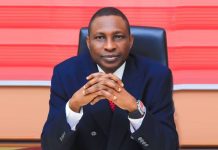 ..I will like to start by expressing my sincere gratitude to the Lagos Council of the Nigeria Union of Journalists (NUJ) for inviting me to speak at this propitious occasion and before these men and women of high- standing.
..I will like to start by expressing my sincere gratitude to the Lagos Council of the Nigeria Union of Journalists (NUJ) for inviting me to speak at this propitious occasion and before these men and women of high- standing.
It is with a deep sense of history that I give this lecture today in memory of a hero of our democracy, Chief Moshood Kashimawo Abiola, whose victory, unfortunately annulled by the military, marked a watershed in our country’s quest for true democracy.
That victory, delivered by Nigerians across geopolitical and ethno-religious lines, undoubtedly remains the most unequivocal demonstration of popular will in our democratic history.
As we recall that landmark event in our political life, and prepare for another general election, we also remember those who equally paid the ultimate price for the sanctity of our democratic aspirations.
I salute the courage and resilience of those who suffered intimidation and persecution in defense of popular will. Today’s event, no doubt, reminds us to remain vigilant and to be more assertive in our demand for good governance as our country approaches perhaps the most crucial general elections in her chequered history.
Ladies and Gentlemen, the situation that confronts us today calls for sober reflection. Today, we live in a society where you become a leader not because you are imbued with right measure of leadership skills, understand the challenges facing our country and the concrete pathways to their solutions but because you come from a certain region of the country or profess a particular religion.
With the nation literally at war, confronted by record unemployment, disturbing infrastructure decay that questions our place as the world’s sixth largest oil producing nation, comatose educational system, a hobbled industrial sector, and disenchanted youth, a gathering such as this reminds us of the need to make our hard-earned democracy more meaningful.
It is the reminder we need, too, to properly appreciate the necessity of uniting as one people, eschewing greed and selfishness, to protect our democracy and stave off those, who lack basic understanding of democratic tenets, and therefore beat the drums of war when faced with electoral defeat.
The truth is June 12 has become a guide to where we are coming from, how we got to where we are today, where we are going and what we need to get there.
It is, therefore, paramount for everyone here, to take a look back to June 12, 1993, and recall how it felt when 21 years ago, the nation received the shock annulment of what is generally accepted as the freest and fairest election in our political history.
This lecture, therefore, seeks to put in proper perspective, the emerging interests and developments relative to the June 12 debacle while extracting necessary lessons that would be crucial to the struggle ahead.
Mirroring MKO ABIOLA
Born in Abeokuta, Ogun State, Chief Moshood Kashimawo Olawale Abiola, fondly referred to as M. K. O. Abiola, was a popular businessman, publisher and politician who epitomized perseverance in the face of daunting challenges.
Indeed, his uncommon ability to overcome adversity and achieve tremendous fortune must have stirred in M.K.O Abiola a philanthropic spirit that remains unrivalled.
Abiola was a detribalized Nigerian who built bridges across the country and a Pan-African patriot driven by a quest for justice and the eradication of inequality. It is therefore unfortunate that this national landmark event has become a regional affair even though Abiola’s connections, philanthropy and admiration were resoundingly pan-Nigerian as was his resounding victory.
Looking Back To the Future
Ladies and Gentlemen, to clearly understand the essence of June 12, there are a number of issues that we need to find answers to. First, we need to classify what June 12 represents – a revolution?
How and why did the counter-revolution triumph? And, perhaps, what lessons are there to learn from the struggle?
To start with and in view of the pivotal place of June 12 elections in our political history, and the lessons therefore, it is expedient that the event is duly acknowledged as a day when Nigerians eschewed primordial and divisive sentiments to vote for a secured future.
Therefore, while May 29 was the actual day democracy was enthroned as a result of persistent and sustained agitation arising from June 12 crises, the actual election represents the Nigerian peoples’ revolution. June 12 was to the Hausa what it was for the Igbo, Yoruba, Nupe or Ijaw. June 12 soared above religion, tribe, social status, or personal ambition.
It was a day Nigerians spoke in one voice, their elemental differences swept aside and forgotten.
That day is the closest we ever came to true nationhood as one mission and vision united our diverse people. Chief Abiola may have died, but he left us with lessons on democracy – from what democracy truly means, to the power of joining forces, the power of courage and the fact that Nigerians can overcome their differences to midwife change.
That loud victory demonstrated that Nigerians are more concerned with a true leader and what he stands for rather than his geopolitical background and political affiliation
There is another strong lesson that we must learn from Abiola’s travails in the quest for democracy. Courage.
The ability and preparedness to stand up and fight for one’s rights and beliefs even at serious personal cost. In the face of his stolen mandate, Abiola was resolute, not minding the risk to his vast business empire and stupendous wealth.
While the military bared its fangs, he refused to recant. M.K.O stood his ground, safe in the knowledge that he had the backing of Nigerian masses that after all, voted for him en- masse.
He dared the bullets of the military, announced himself president and fought until the end. The struggle that followed his demise, more than anything else, demonstrated that Nigerians couldn’t be taken for granted by either the military or any civilian dictator for that matter.
Today, reminiscent of that spirit, Nigerians from all walks of life have globalized the plight of the innocent Chibok girls even in the face of state-sponsored intimidation and campaigns of calumny.
Indeed, Ladies and Gentlemen, Chief MKO Abiola’s death would have been in vain if Nigerians do not demand good governance and stand for the sanctity of their vote at the next elections.
This is the highest lesson we can imbibe from his death as a people seeking visionary leadership that we can truly call our own, one that truly represents our desires and aspirations, and carries our burdens. This, in my thinking, is the challenge before us.
The Quest for True Leadership
June 12 also showed us the consequences of allowing our judiciary to dispense with neutrality and descend into the arena as our courts were manipulated into laying the foundation for the election’s annulment.
Going forward therefore, the judiciary must resist any attempt to abuse its processes and procedures in a quest to truncate the people’s will.
Never again should our courts earn public opprobrium by appearing to shirk their toga of impartiality and condoning judicial abuse by the political class.
The success of our democracy, gentlemen of the press and distinguished audience, is largely dependent on the effectiveness and efficiency of the electoral process.
While I agree that one of the ingredients of credible elections is political will on our leaders’ part, the issues transcend them.
Leaders alone cannot do it. All Nigerians, including the political parties and security agencies, have vital roles in the formulation of a credible electoral system.
While the current electoral body under Prof. Attahiru Jega has made appreciable progress in conducting credible elections, the challenges lie squarely with Nigerians, because those who conduct the elections are Nigerians who must see themselves as stakeholders in making it work.
It is crucial for the survival of our nascent democracy for potential losers to be sportsmanly and the winners to be inclusive in victory.
As the June 12 debacle has demonstrated, the success or failure of any electoral process is directly related to the underlining institutional framework and rules which ultimately regulate the conduct of the major actors and the elections’ outcome.
To strengthen representative governance and engender the electorate’s confidence in the electoral process, therefore, we must implement genuine and far-reaching electoral reforms that ensure transparent, reliable, and credible elections.
The Independent National Electoral Commission (INEC) and the relevant state electoral commissions must be granted full autonomy that ensures efficiency and isolates the bodies from direct or vicarious pressure by the executive or by any other body or individual.
When politicians know that they cannot rig or otherwise manipulate elections, they will be less likely to abuse their office or disregard the desires of the electorate for good governance knowing that the people will be waiting for them down the road.
In the final analysis, gentlemen, only a credible and transparent electoral process, built on efficient and effective system, can stabilize and sustain our democracy.
Another obvious, but inadequately addressed threat to our democracy is the growing percentage of unemployed youth. Indeed, popular uprising usually thrives on underlying discontent that is distinct from the ostensible trigger as demonstrated by the Arab Spring which started with a street trader’s self-immolation in Tunisia.
Similarly, the national uproar over the June 12 crises was propelled as much by an enraged electorate as it was by disenchanted youth who saw in the annulled election a lost opportunity for salvation.
More recently, while several reasons have been proffered for the current insurgency in the North-East, widespread youth unemployment has no doubt encouraged violent crises in that and other parts of the country.
Any effort to entrench true democracy must therefore see to the empowerment of our youth through productive engagement and functional education for participatory governance is not for the hungry.
This reality is partly responsible for our commitment to youth development which is also driven by our quest to ensure that this largest component of our population is also its most productive.
Within the last three years in Kwara State, we have employed 10,200 youths apart from generating a greater number of opportunities in the informal sector by mobilizing the economy through various loans to our people amounting to N640m.
We have also made our education more functional by prioritizing vocational skill acquisition and entrepreneurship training at secondary and tertiary levels.
For me, those who will survive the current economic uncertainty are not those with abundant resources but those who are resourceful and work outside the box. I make bold to assert that Kwara state’s continuity programme has benefited the state immensely and instilled greater hope in our democracy.
We started with the diversification of our economy from a civil service state depending largely on the federation account to a state depending on agriculture and evolving an investment-friendly environment built on industrial harmony, modern infrastructure, a conducive tax regime and a largely crime-free and peaceful environment.
The benefits include but are not limited to, the iconic Shonga Farms, increased inflow of investments, the only Cargo Terminal with a wet station in the zone, a Youth Farm Settlement, an International Aviation College, and the International Vocational Centre, Ajasse Ipo.
These have combined to establish our state as the agriculture hub of the sub-region and created an expanding crop of youth entrepreneurs.
Conclusion
As the nation marches into an election year, in 2015, it is incumbent on every Nigerian to be on the alert about the processes that would guarantee a free and fair election and usher in a leadership that will genuinely transform the lives of our people.
The June 12 struggle simply re-enforces the fact that the actions or inactions of the different parties in any revolution play a huge part in determining the shape of or balance of forces in the political history of any nation.
In essence, what persons, organizations and alliances do or do not do largely re-enforces held views, values and strategies and determines the direction of any nation’s life.
The June 12 political revolution is about transparency and adherence to the rule of the game. One of the greatest challenges that threaten democracy is impunity and arbitrariness.
While I am not advocating violent change, I clamor for a peaceful revolution through the free and assertive expression of popular will by all Nigerians. Long before the Arab spring, Nigerians demonstrated their capacity to stand up for their right and bring about the type of leadership with the capacity to create spaces for their prosperity.
Indeed, it was the opposition against the military junta that forced the military to resume the truncated return to democratic rule and gave us a government we could call our own, however flawed. Until the people decide to legitimately fight what they do not like, therefore, nothing will happen.
I, therefore, urge progressive forces to set aside, like we did on June 12, ethnic differences, religious sentiments and personal ambition to build a New Nigeria, where every citizen has the opportunity to be what they want to be, to earn a decent living and where the elderly, disabled and the unemployed are assisted by the state.
Let us a build a New Nigeria in which governance and prosperity are inclusive. Those who brandish progressive credentials must ensure their conduct does not sully the ethos of the movement which essentially entails purifying and elevating politics and governance.
Let us come together to build a New Nigeria that will be economically and socially vibrant. Let us be united to build A New Nigeria where preference will be given only to the content of our character and not to parochial considerations.
Nigeria of my dream is a nation full of opportunities for all; a nation where we see ourselves first as a Nigerian rather than an Hausa, Ibo, Ibibio, Yoruba or Nupe; I dream of a country where individual’s ability and capability become more significant than his place of birth; I dream of a nation where our diversity becomes the source of our strength; a nation of hope for a better and more prosperous future; a nation where corruption becomes an aberration rather than the rule.
Our democracy has come of age and June 12 has set a standard for us to follow. His soul will truly rest when we walk the path he has shown us.
Gentlemen, I rest my case. Thank you
Being a lecture delivered by Kwara State Governor, His Excellency, Dr Abdulfatah Ahmed at Osun Hall, Airport Hotel, Ikeja, at the commemoration of June 12, 1993 Presidential election organised by the Nigeria Union of Journalists, Lagos State Council on June 12, 2014.



